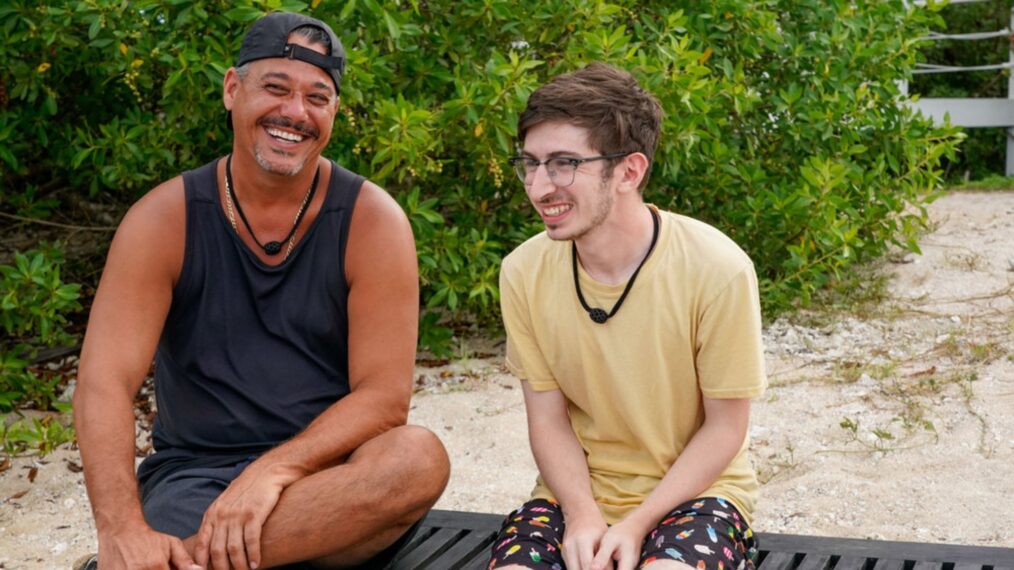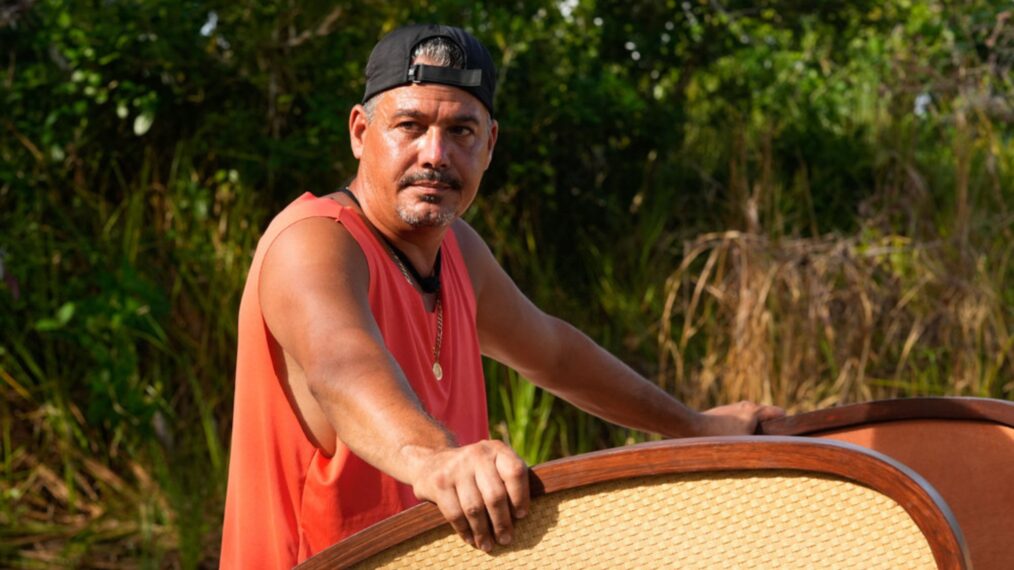Products You May Like
Rob “Boston Rob” Mariano had a lot of confidence coming into Deal or No Deal Island, and he still has a lot of confidence after leaving the game, too — even if it isn’t as the inaugural season’s winner (that honor goes instead to Jordan Fowler).
During the final group challenge, Rob faced a stiff penalty for looking over at Amy McCoy’s answer, so the Survivor alum had to wait three minutes after the last person departed the station to run through the massive maze and find one of the high-value cases. Being held back was an exceptionally big problem for him this time because, well, two of the last four contenders would be eliminated based on (1) the slowest to finish the race and (2) whoever had the least cash in their case of the remaining three.
Though he dug in deep as soon as he could put foot to sand and race it out, he still returned to the finish line last and was thus eliminated to finish in fourth place.
According to Rob, if not for that terribly-timed penalty, he would’ve “easily” crushed the competition and taken home the cash.
TV insider caught up with Boston Rob to talk about his near-miss in the finale.
What was going through your mind during that last stretch? Did you think you had it on Amy while running through the last challenge?
Rob “Boston Rob” Mariano: I mean, I knew Amy had a pretty big lead on me. I was hoping that she would get lost at some point or take a wrong turn because just from where she was to where I was, it was a pretty big gap to make up.
Did you ever find out what the value of your last case was, and if you’d have made it into the top two?
I personally didn’t open it but Joe Manganiello and I have spoken since the show ended, and he told me he did open it and that I would have made it. Adds a little salt to the wound.
So when you said there was a big gap between you and Amy, do you think if you hadn’t had the three-minute penalty, it would have made a difference?
Oh, without a doubt, yeah. And effectively, I think it was more than three minutes despite what was shown. But it was significant enough that it was the difference-maker for me, unfortunately.
Do you think it was that you didn’t hear the rules because you were concentrating on something else? Because you expected that you knew what he was gonna say?
Definitely, definitely. I was paying attention to everything that was going on in the challenge… trying to figure out what to do, and a lot of times when they go through these rules, it’s not as simple as Joe just saying like, this. There’s many, many rules that they go through. So that was one snippet of it.
And yeah, I mean, partially, I kind of feel like — they definitely said it, I’m not saying that. I’m just saying like, I think I have a lot of history playing these games, especially on Survivor where not only is that allowed, but it’s kind of actually encouraged that like if you’re not paying attention to what your opponent’s doing, and if they don’t cover their board, if they leave it exposed, you absolutely should look at it.
So I definitely didn’t think at the moment that I was doing anything wrong. Obviously, when they said, “Stop, stop,” I knew right away, and I accepted the penalty, and we moved on from that. Unfortunately, it was a penalty that cost me my ability to continue in the game.
Since you would have moved on with the top two cases when you saw what Jordan and Amy had to do in the final, how do you think you would have fared in that challenge?
Easily, I would have won easily. Yeah, I’ve played hockey my entire life. I’m really good at balance, and I truly believe I would have been able to do that easily. So also tough to watch.
At the start of the season, you predicted that no one would even try to get you out. What made you feel confident about that?
You know, if I’m given the opportunity to play these games — meaning that they don’t target me right away — then I can find a legitimate reason to work with other people. And it’s not only because I’m good about talking my way into a situation but because it actually makes sense for them to keep me around in a lot of different scenarios. I’m good at building the final case. I’m good at the challenges. I can help them get further. I’m always going to be a target for them to get out at some point. So if they’re smart, they do keep me around a little bit. But also, it’s not smart. I don’t know. I think I just have a good amount of experience, and I leaned on that to be able to negate my target and utilize what I know to my advantage.
Speaking of smarts, you had a lot of comments about people’s intelligence throughout this game. We heard a lot about who you don’t think is smart, but who was your toughest challenger in the intellect department?
I mean, definitely my biggest opponent is always myself. I feel that, ironically, even the way the show ended, nobody actually ended up getting me out. I didn’t lose because of luck. I made a mistake and overthought a challenge and thought I could get an advantage in a spot and it ended up costing me from the outset. Aron and Branson were the only other two contestants that I believe fully understood the math and the statistics part of the Deal or No Deal equation. And I’m not saying that the other ones didn’t grasp it, but I don’t think they understood it to the extent that we did.

NBC
You’ve said you pride yourself on being able to read people, but going against the bank there’s really no opportunity for that. So what was your strategy in the temple?
It’s just strictly math. I mean, all you do is choose cases at random. There’s no rhyme or reason to it. And you hope to get a board in your favor is not necessarily what it may feel like to the audience. A board in the player’s favor would be one high case and a little a lot of low cases. So that the discrepancy between the high side and the low side, it’s a big discrepancy, and your offer falls in between. So there’s more little cases that you could potentially choose that high. And then once you have the odds in your favor, it just comes down to luck. You make the deal.
And if you’re ever in a situation where you don’t have a good board mathematically, then you do continue to play, because at worst, you’re going to come down to two cases — your case and one case left up there. So at worst, you’ll have 50-50 odds. In this whole season, the only time somebody took a deal that was worse than 50-50 was Miranda, and that’s because they offered her a personal offer. So she decided that money was worth it for her to take the low loss and I think she still had a 25 percent chance of staying and keeping the money. And the other thing is it’s never going to be 100 percent. You’re not going to get that. At best if you had an 80-20 [odds] that would be considerably good in your favor of a big deal. But there’s still 20 out of 100 times you’re gonna make a bad deal. And we saw people make bad deals — not to their discredit, not because they played incorrectly, but they just got unlucky. So I would argue that that’s the real key to the game on the Deal or No Deal Island is to play correctly. And by correctly, I mean mathematically sound and whatever happens, happens.
Would you have taken one if you had had the opportunity that she did?
I mean, I did have an opportunity to take $75,000 and put it in my pocket with no real repercussions other than I’d have a little marble, but, I mean, I was out there playing to win. So, I mean, that was my objective and that’s why I went there. So it wasn’t about a personal offer. To me, it was always about winning.
So you mentioned your friendship with Aron. Why was he able to fool you?
In the bluffing competition? Again, I really think that was me outgoing myself. I gave him more credit than he deserved. I thought that he would know enough to pull a reverse bluff on me. And I was like, “Man if he is, then I should choose the opposite of what I originally thought.” But in all actuality, he didn’t. He wasn’t following up on me. He just exposed what his tell was. So I should have went with it. That’s a good lesson for a lot of people, too, is always go with your first decision, your first instinct, and I kind of went against it, and it cost me. But I got lucky and ended up being able to take out Kim in the process. So it worked out.
Were you surprised at all in his confessional when he said that he didn’t really trust you?
I mean, he shouldn’t really trust me fully. So it didn’t really surprise me. I think towards the end when he was eliminated at the final five, the other people were really working hard to go in a different direction. But I’ve spoken with him since then, and I believe him when he tells me that he wasn’t actually going to get me out. It makes sense to at that point anyway.
What did your family think about the fact that all their birthdays were chosen as cases?
What’s great is like, this is the first time — I’ve done so many seasons of Survivor and The Amazing Race and all these shows — where they’re actually old enough to be able to sit down and watch and understand everything that’s going on. So every week was a lot of fun to sit down together and watch the show.
Is there any chance now that it’s been renewed for Season 2 that you’d want to come back and try again?
I mean, I think I’ve made a pretty good run and a good impression, but let’s have some other people have a shot. Maybe if it stays on the air for five or 10 years, they’ll do an all-star version down the road. But let’s take a little break.
What advice would you have for someone coming into this show for the first time?
I think the biggest thing is you have to have a willingness to want to try. And the number one trait that you can use to your advantage is self-awareness. If you have the ability to know how other people are perceiving you, that’s like a really good trait to have for a lot of the shows, especially the ones that involve voting or eliminations. If you go on shows that have a social and strategic component to it, you have to know how you’re perceived by others. Also, willingness to adapt, because the situations are always going to be changing. So if you’re able to adapt and you’re self-aware, I think you have a good shot. And just go for it and try it because you never know.
Deal or No Deal Island, Streaming, Peacock
